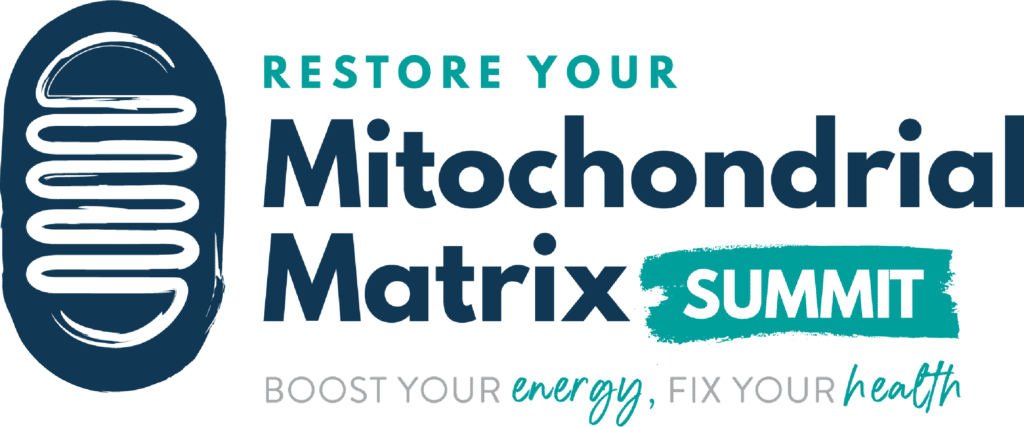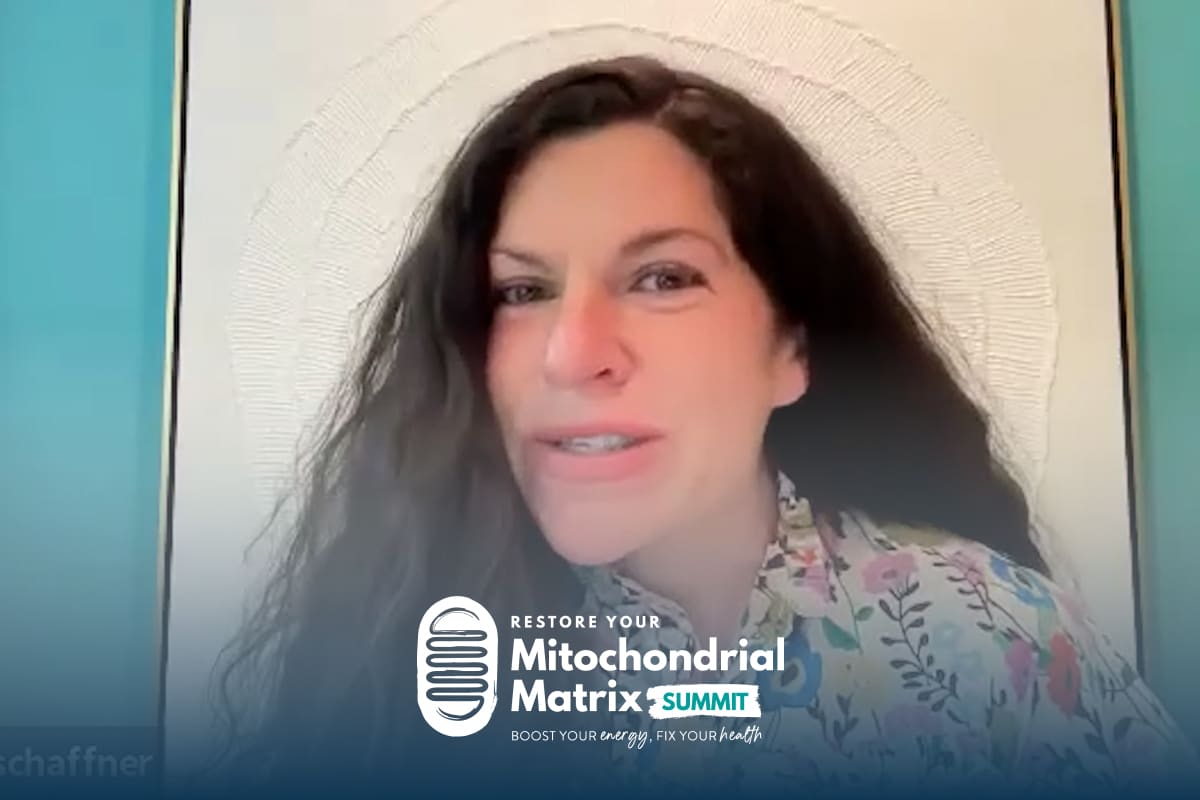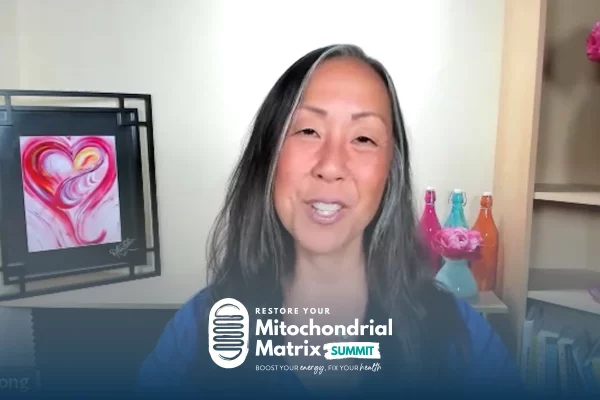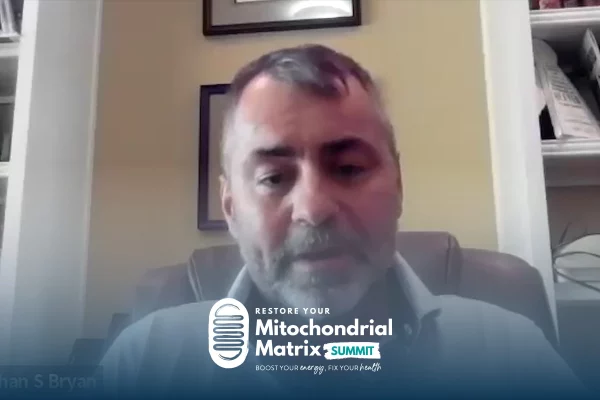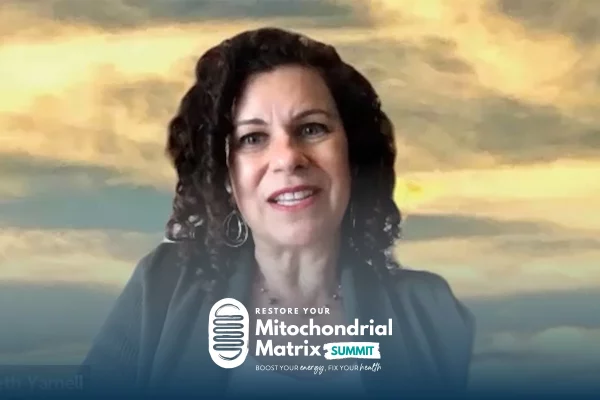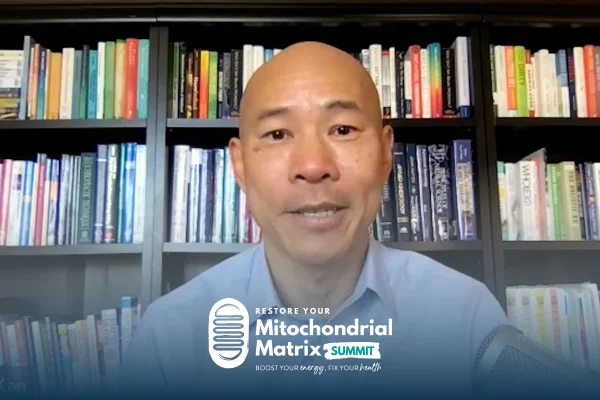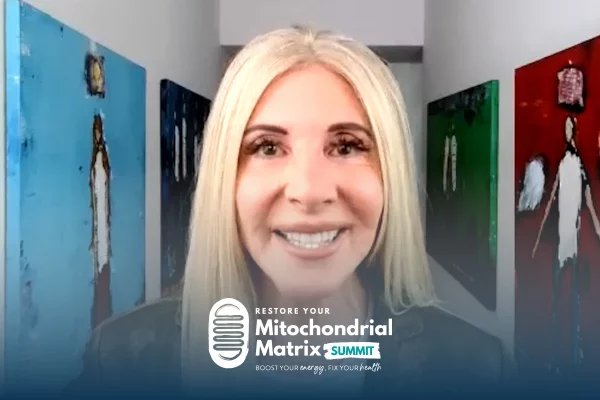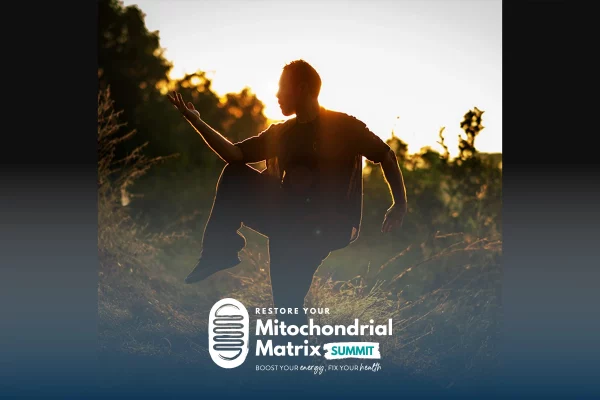Join the discussion below
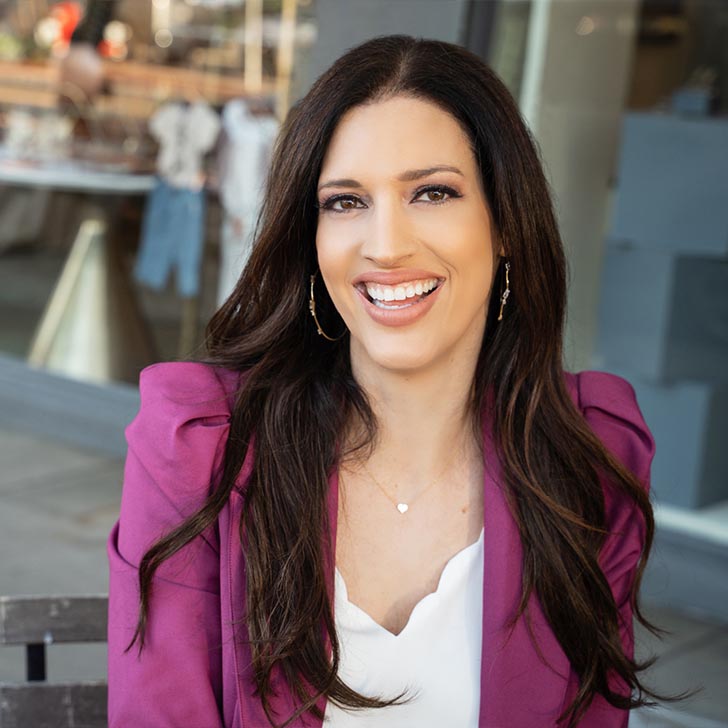
Laura Frontiero, FNP-BC, has served thousands of patients as a Nurse Practitioner over the last 22 years. Her work in the health industry marries both traditional and functional medicine. Laura’s wellness programs help her high-performing clients boost energy, renew mental focus, feel great in their bodies, and be productive again.... Read More
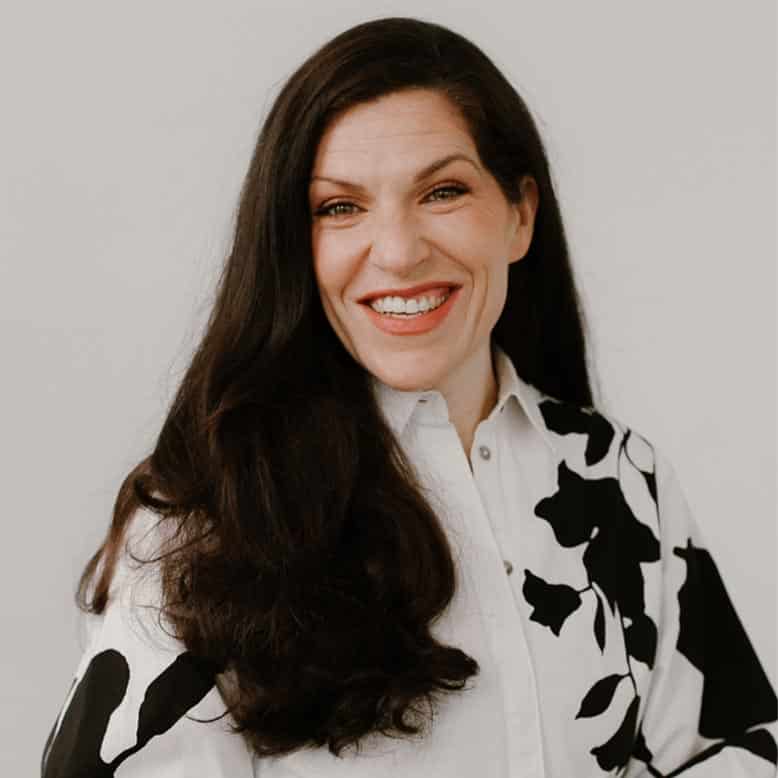
Dr. Christine Schaffner is a board-certified Naturopathic Doctor who has helped thousands of people recover from chronic or complex illnesses. Through online summits, her Spectrum of Health podcast, network of Immanence Health clinics, and renowned online programs, Dr. Schaffner goes beyond biological medicine, pulling from all systems of medicine and... Read More
- The importance of circadian rhythm for longevity
- The link between circadian rhythm and mitochondria
- How to create a safe sleep environment
- The importance of melatonin and what happens when your levels are low
- How to reboot your circadian rhythm if it’s ‘off’
Related Topics
Aluminum, Biochemical Signaling, Brain Health, Cell Detoxification, Cellular Function, Chronic Disease, Chronic Illness, Circadian Rhythm, Circadian Rhythm Mismatch, Cognitive Decline, Disruption Of Melatonin Production, Dysfunction, Electromagnetic Radiation, EMF, Fluoride, Foundations Of Health, Glyphosate, Healthy Circadian Rhythm, Light Input, Living Well, Longevity, Melatonin, Mitochondria, Mitochondria Function, Mitochondrial Activity, Mitochondrial Dysfunction, Neurological Illness, New Cell Creation, Photobiomodulation, Photodynamic Therapy, Pineal Gland, Red Light, Reset Mitochondria, Sleep Cycle, Sleep Process, Sleep-wake Cycle, Toxicants, Wavelengths Of LightLaura Frontiero, FNP-BC
Welcome back to the Mitochondrial Conversation. I’m your host, Laura Frontiero. I’m bringing you experts to help you boost your energy and fix your health so you can build the life you love. And today, my special guest is Christine Schaffner, N.D.. Hi Christine, welcome to the summit.
Christine Schaffner, N.D.
Oh, thank you so much for having me, Laura. It’s always fun to hang out with you.
Laura Frontiero, FNP-BC
It’s so good. And I really wanted to bring you on this summit to talk about something really critical to mitochondria function, dysfunction, chronic disease, and that circadian rhythm. And I think this is something that people don’t realize how important it is, and also we don’t realize once it’s screwed up, how to fix it. And I know in my personal practice, I’ve worked with people that this piece alone will hold them back from their healing, if this piece doesn’t get addressed. Would you agree?
Christine Schaffner, N.D.
Yeah, I think that’s such a great point. With the work that we do and the people that we see, sometimes we could over-complicate things, or really go to that kind of really targeted therapy that is gonna be the thing that unlocks the key, but as we know, if we don’t have the foundations of help with circadian rhythm dialed in, this is an obstacle to cure in my opinion as well.
Laura Frontiero, FNP-BC
Oh yeah, it is, it is. So I’m so glad we’re on the same page. And I want to introduce you to our audience, for those people, viewers who might not know you, which is hard to think, because you know your way around the summit circuit. You’ve been on many, hosted them, everything. So, Dr. Schaffner, you are a board-certified naturopathic doctor who’s helped thousands of people recover from chronic complex illnesses. And through online summits, your Spectrum of Health podcast, a network of Immanence Health clinics and renowned online programs, you go way beyond biological medicine, and you pull from all systems of medicine and healing modalities, and you really help patients reclaim their wellness and reveal their brightest light. So we’re gonna get into this. Interesting we’re talking about light today, right? It’s all perfect.
Christine Schaffner, N.D.
I have my friend Agnes who helped me come up with that. She’s very creative with words, right?
Laura Frontiero, FNP-BC
It’s so good, it’s so good. So before we kinda dive into the problem and how to fix it, would you just unpack for us what is circadian rhythm and why might we be interested in the importance of this?
Christine Schaffner, N.D.
Yeah, I think it’s a really important topic, especially in modern time when we have so many things that take us out, if we choose, of our natural rhythm. And this is a topic around our biological clock, and this rhythm that we have around the cycle of the day. And the more that we learn about health, I find that the more that we connect with natural rhythms, that’s where we really connect with our inherent ability to heal and repair. And so, the circadian rhythm is that daily rhythm throughout the day. It has a lot to do with our sleep-wake cycle. And then there’s a whole other field called chronobiology, where we actually have different times a day, and the Chinese medicine, ancient Chinese medicine philosophy knows this really well, that there are different times of the day where our different organ systems are gonna be working or balancing, and that’s a great time to either target therapies or supplements during that time. And so, just think about this very simplistically as your biological clock. And it’s very, very dependent on the light input that we get from the environment. And so, that’s the briefest summary I can give ya.
Laura Frontiero, FNP-BC
That’s good, that’s good. So now tell us, since we’re on the Mitochondria Summit, what’s the link between circadian rhythm and mitochondria? And then we’ll go from there.
Christine Schaffner, N.D.
Yeah. You know, I think there are many links. I’m so glad that you’re giving more awareness around the mitochondria. I mean, it’s a hot topic, but there’s so much as we dive deeper into it. And I like to look at the lens of mitochondria through a few different things. There’s one aspect that we look at biochemical reactions in the mitochondria, but we also know that some parts of the mitochondria are what we call chromophores and they’re actually very sensitive to light input. And so it’s this combination of biochemical signaling and also light input from our external environment that allows our mitochondria to function best. So one of the things that we use in the field of Photobiomodulation or photodynamic therapy, as we know red light, which is, you know, something that we can, you know, biohack our way around in 660 nanometers roughly, but all of the wavelengths that we get through different applications of light are actually widely available through the sun. And the sun is the biggest, I would say, coordinator of our circadian rhythm. And it’s gonna be, you know, those changes in between, sunrise to throughout the day and then sunset that we’re getting different wavelengths of light.
And why, you know, it’s a hard time right now for our circadian rhythm is ’cause we’re often in an indoor environments where we’re getting that circadian rhythm mismatch when we’re basically around a lot of blue light technology that might be, you know, mismatch for the time of day. We have a lot of junk lighting through fluorescent lights, even LEDs, if they’re not timed at the right time of the day. And so when we think about the connection with the mitochondria, my first kind of wanting to educate is that if we’re not exposing ourselves to proper wavelengths of light, especially during the day, we might not be getting that other input. If we don’t have a red light device, you know, in our home to support our mitochondrial activity. So that’s kind of one quick way. I mean there are many others, but I think when we think about the mitochondria and they’re obviously, they’re abundant within our body and correct me if I’m wrong, but I’m very aware that the brain has the most mitochondria in the body. And so when we think about really our brain health and our circadian rhythm and how that’s tied into sleep, there’s a huge connection to the health of our mitochondria in our sleep cycle and our brain health in preventing, you know, cognitive decline or recovering from a neurological illness as well. So I see it from all of those angles.
Laura Frontiero, FNP-BC
Yeah, and so I always think of also with circadian rhythm when it is not functioning, when you are not functioning in your life in accordance with circadian, with the natural circadian rhythm, that’s innately built inside of us, it really makes it hard for cells, any cells, and the mitochondria inside the cells, to actually do their job, to actually create new cells, to slough off old cells and get rid of them. And this just sets us up, I think, in the cascade of problems that set us up for chronic disease. And I always say, we have a word for mitochondrial dysfunction. In fact, we have several words for mitochondrial dysfunction. It’s called cancer. It’s called heart disease. It’s called autoimmune disease. It’s called, you know, on and on. So that is at the core what is the end result of mitochondrial dysfunction. So when your circadian rhythm is not, when you are not in sync with your circadian rhythm, it just sets you up for all that to happen faster. Am I right?
Christine Schaffner, N.D.
Yeah. No, I think that’s a really great angle to look at it. No, I love that. And I would add to that list of many illnesses, you know, neurodegenerative disease as well ’cause I see a lot of that. And yeah, the mitochondria are very important.
Laura Frontiero, FNP-BC
Yes, yes. So can you talk to us a little bit about melatonin in this and how it plays a role with circadian rhythm and the functions of it too? Because a lot of people think that melatonin is just to help you sleep, but there’s a lot more to that hormone and our circadian rhythm, being in sync with our circadian rhythm helps us make sure that we have adequate amounts of it. Right?
Christine Schaffner, N.D.
Yeah, absolutely. So melatonin is a key factor in our sleep-wake cycle and we’re learning more about melatonin. So the first kind of point that we wanna get across is that when we’re getting ready to sleep, obviously we are hopefully in the nighttime, unless you’re a night shift worker and that is actually known to be even a carcinogen, working the night shift, because of the detriment on people’s health. And you can see that impact on circadian rhythm just from that statement there. And so when we, you know, go to bed, there is light that we get that input through our eyes and then that connects to our brain and that can signal to our pineal gland to produce melatonin, melatonin helps us begin the sleep process. And so couple points I’d like to make is that our pineal gland, unfortunately, is under assault, as well as, you know, just as much as our mitochondria. I feel like modern day is really having an impact on our pineal gland. And we’re very exposed to so many toxicants that are disrupting our production of melatonin through our pineal gland. So that can be to name a few, fluoride in the water, glyphosate in are genetically modified foods, and really everywhere now, even if you eat organic, unfortunately you are exposed to glyphosate. Aluminum, which is really ubiquitous in a lot of our personal care products, our medicines, also our food, our water, our air and EMF. So EMF or EMR, so that electromagnetic radiation that we get from cell phones and smart meters, and, you know, all of these things that are really having a huge impact and even calcifying the pineal gland.
And I actually more refer, I do a lot of dental referrals in my office, ’cause I look at the oral microbiome and the dental health and it’s role in chronic illness and on what’s called a cone beam scan of the mouth. One of the dentists that I work with can point out if they see calcification of the pineal gland. And so that is actually radio graphical sign. And so it’s not just, you know, you Google things, “oh does my pineal gland really calcify?” It’s actually we’re seeing it. And so what that means is that just it’s repairable, there’s many ways to help it. But what that shows is there’s a reduction in function. And so I wanted to just set that up because we’re in like a melatonin deficient time. And then through, you know, just another kind of like hopeful, you know, hopefully understanding too is we don’t just make melatonin through our pineal gland, our mitochondria actually make melatonin and we need melatonin, mitochondria or melatonin, to help stave off basically the reactive oxygen species that are generated. Our gut microbiome actually produces a lot of melatonin. So we have Mother Nature’s equipped us with this very potent and powerful chemical to really help us with our circadian rhythm, and again, helping you with sleep. And then just to kind of go back on that and then I’ll flesh this idea out a little bit, so that helps you go to bed. And melatonin actually is very helpful, not only for circadian rhythm, but it’s very what we call neuroprotective.
It’s a very potent antioxidant. It’s used in cancer therapy. It’s used in helping to detox the brain and it has two functions I find that why it detoxes the brain and then it helps again into sleep. And during our sleep state, our lymphatic system is that that’s when it’s most highly active and that’s the lymphatic system in our brain, it’s called the glial-dependent lymphatic system. So all of those things that I just mentioned that are affecting our pineal gland, we need the natural ability for our bodies, or in our brains, to detoxify at bedtime to get those things out of the brain. So melatonin is assisting in that and that it actually helps to shuttle. There are papers to show that it helps to actually remove heavy metals and other pathogens out of the brain. So it’s that twofold kind of use. And then when we wake up and we get the signal from the sunrise, which is if you take anything away from this talk, having your eyes look at the sunrise and the sunset every day can be very, very helpful for your circadian rhythm. And when you look at the sunrise and then that signals your body to break down melatonin and kind of get that increase in energy to meet your day. So that is the long winded question or answer to your question, but I’m happy to take that in any direction, but you know, the bottom line is, I think our circadian rhythms are definitely affected by modern times and that also of itself we’re in a melatonin deficient time because of all the stress that we’re up against.
Laura Frontiero, FNP-BC
Yeah, I’d love for you to unpack. I think people are unknowingly sabotaging their circadian rhythms. And obviously you mentioned somebody who works night shifts, it’s a known carcinogen, it’s a known disruptor to your health. And so if you could unpack some of the other causes of why circadian rhythm becomes disrupted. ‘Cause I think there’s a lot of things in our modern environment that people don’t realize is actually contributing to the problem. And probably there’s some simple solutions as well. So if we could talk about why is this a problem in our modern world?
Christine Schaffner, N.D.
Yeah, you know, so many reasons right. And you know, I think lighting is, again, the number one, I think, issue in modern life in that if you’re not cognizant of it, you can very much be in a lighting environment or junk lighting environment that is not mimicking in the natural rhythm of the day light. Just an aside, there’s actually an architect who actually does circadian lighting for office spaces and homes. And I really think that’s the future, you know, and I think that we feel better naturally when we have that connection to the light that we’re exposed to that’s mimicking the day. So often if you’re working a lot or you’re in front of a computer, you can very much miss the signals of sunrise and sunset. And you can, especially in the evening, ’cause sleep is so important, you can have that overstimulation, especially a blue light. Blue light is more peaked in the morning. So in natural lighting there’s more blue light in the ambient atmosphere in the morning. And so if we’re giving people that input at night, the pineal gland is confused and the biological clock is confused. And then that is gonna be very much working against us. And so one, you know, hack there that I really like is many people know about screensavers now that can take out the blue light, you know, in your devices. I mean really the name of the game. I think we need to go back to culture where people actually don’t work after dinner, but I haven’t figured that out yet. So I, you know–
Laura Frontiero, FNP-BC
Oh, oh you mean you work after dinner too?
Christine Schaffner, N.D.
So until then, you know, what I do in my office in my home is I have one of those light bulbs that changes light. So during the day it can be just the natural Candescent, you know, yellow light. And then in the evening I can turn it to red. And red light is actually what, you know, when think of a beautiful sunrise, there’s a lot of pinks and reds and you know that is really the wave length of light. That’s very helpful for signaling our circadian rhythm. So I use that. I also–
Laura Frontiero, FNP-BC
Real quick question. So sunrise light and sunset light are important, right? So, so we hear about getting your eyes on the sunrise, get outside, don’t just go straight to your office and start working. But that those pinks and reds are sunset, right?
Christine Schaffner, N.D.
Exactly, exactly. So, you know, if I’m working, which often I am after you know, put my daughter to bed and it’s clearly the sun is setting. In Seattle right now it’s lovely. We’re recording this in the summertime and the sun is out or the sun doesn’t set until nine o’clock. So it’s kind of a little different situation, but having that red light at night is really helpful. You can also use blue blocking glasses that are usually amber tinted that also can give you that feedback. You know, I like the Himalayan salt lamps. I think there’s something to them, you know, that can be nice to create a natural environment. I also have my red light therapy. I have a sauna space photon in whatever brand. I mean, there’s so many brands out there I’m just sharing kind of what I have, which is red and infrared. And I’ll use that at night as well. And so all of those things create a kind of more circadian mimicking lighting scenario at night. So I think that’s really important. And then I think, you know, we mentioned before we got on, you know, grounding gets a lot of attention and there’s different ways to understand why it works. And you know one of the biggest ways that I think that grounding works, of course it connects us with nature. It helps to us to feel good and get that benefit. But you know, we’re in this very toxic time and I mentioned that melatonin is an antioxidant. And with that on the other end means is that we’re really full of either free radicals or we’re also depleted in electrons and so to mitigate the stress that we’re up against.
And so Dr. James Oschman mentions it beautifully. He calls it grounding helps us to increase our electron reservoirs, basically in the fashion that the extracellular matrix, so that we can be prepared for the stresses at hand. So I think grounding is a really wonderful way as you’re getting back in the circuiting rhythm, as you’re dealing with the, you know, stress. And then one of the things that I think is really important to amplify and support your sleep is to create a safe sleeping environment. And that has evolved over the years as technology has changed. But one of the biggest things that you can do is to turn off your WiFi router at night, because WiFi can essentially interrupt your sleep and your pineal gland’s production of melatonin. There’s studies actually around how it depletes melatonin and so forth. And so we have people turn off their WiFi router at nights, and people opt to not have WiFi in their home environment to even create even more healing environment. And then really having blackout shades, of course. So really having a kind of a cave-like dark environment. And if you can, you know, definitely not bring any devices in your bedroom. Some days are better than others, but not to bring your cell phone in, or if it’s in your bedroom to turn it on the airplane mode or make sure it’s on night shift or if you’re checking anything at night, because I think that’s another, you know, really important aspect for getting good quality and all the phases of sleep. I also am a fan, there’s a technology called the chilipad, but there’s different ways to do this, but having the core cooler body temperature at night can make sure that you can get into not only all the non-REM, but also REM stages of sleep and enhanced sleep quality to enhance, of course, all the benefits that sleep has on our body. So, and then not having anything plugged in around the bed that can affect that can create an electrical field and dirty electricity. And so just having, you know, having your bedroom be a sleep sanctuary and having it really be a safe place that does really geared towards, you know, sleep. And so those are some ideas to really support circadian rhythms and sleep.
Laura Frontiero, FNP-BC
Can you go back to grounding for a minute? You were talking about grounding being important now. I mean, I’m lucky. I live on a beautiful property with a gorgeous yard and I can in between appointments, when I’m in my office for hours and hours at a time, I’ll run outside and I’ll just pace my big, long lawn in my bare feet. And I will just, you know, go in there and feel the grass between my feet and connect with the earth. But if you don’t have that ability, if you live in an urban jungle and there’s not a place where you can go put your feet on the earth, or maybe you just don’t wanna go bare feet where you live for one, cause it’s yucky, what do you recommend to people? What can they do for grounding?
Christine Schaffner, N.D.
Yeah, it’s a great question. And you know, again, we’re all, you know, you and I are blessed where we have some grass to go on and yeah, that’s not always the case. And this is where, you know, I think a lot of biohacks come in. And so there’s a couple strategies that I’ll share. One is what we call a grounding pad. So it actually is gonna be mimicking the energy that you get from the earth in a pad. There’s one from a company called SAMINA. They have a one called Lokosana. It’s essentially from, I think, Austria and it really works. But when you use the grounding pad, you wanna make sure it’s grounded.
Laura Frontiero, FNP-BC
Yeah.
Christine Schaffner, N.D.
Number one mistake people make, if they land a grounding pad and they don’t feel better, they feel worse. There’s two ways to ground a pad. It’s actually putting a stake in the ground and grounding it so you’re getting that connection to the earth, or plugging it in, which is way more common, especially if you don’t have access to the patch of grass. And so you can plug that into an outlet, but you wanna make sure that the outlet is grounded and you can get one of those little detectors to see if it’s grounded from Home Depot, they’re inexpensive. And you wanna just make sure you have a grounded outlet. So that’s a technology that I do think it’s worth. I think it is a investment to consider, especially if you are struggling with a chronic illness and really focusing your energy and recovering, I think it’s important. I don’t know scientifically if this would essentially be considered grounding, but I think it mimics the idea a lot. I mentioned those Himalayan salt lamps and they have actually ones that you can put your feet on. So you’re actually putting your feet on Himalayan salt stone, which are these ideas of having kind of a little, either stone or natural substance that it’s not going to be quite, you know, getting the same energy as Mother Earth, but there is this kind of idea of getting electrons, you know, from those stones. And so that’s kind of a less expensive option as well. And then if you really, you know, are not into either one of those, you can biohack the idea, right? So the idea is, again, to get in connection with earth, to get the energy, especially the electrons from Mother Earth so you can improve blood flow, circadian rhythm, decrease inflammation, you know, support all of these aspects to our health. So one way, you know, that again is a hack is they have these hydrogen tablets, which are, you know, called hydrogen water. And so they’re these magnesium tablets that dissolve hydrogen gas in the water, and you drink them within about 10 to 15 minutes when you’ve prepared it, and that can help to again, increase electrons to help support you in that way. And so there’s also hydrogen water. That’s again another expense because you have to get a filter that will make hydrogen gas in your water, but it’s a great tool as well. So hopefully people can find one of those tools helpful while they’re–
Laura Frontiero, FNP-BC
Yes. So I wanna point everyone on this summit, we actually have a hydrogen water specialist, it’s Paul Barattiero is with us. So find his talk because he talks all about the importance of hydrogen and water. It’s just like the segue into what you just said, Christine. And then he talks about all the different ways and different products you can use to get hydrogen in the water as well. And then for the hydrogen tablets, the one I know of is Quicksilver Scientific’s H2 Elite. Is that what you’re talking about?
Christine Schaffner, N.D.
Yeah, I use that one currently. Yeah, there’s a few in the market, but that’s the one that I think is most widely available.
Laura Frontiero, FNP-BC
Yeah, it’s amazing. So if I’m feeling like really, if I have a two o’clock slump, which is unusual for me, ’cause I have my energy pretty dialed in, but if I’m really just go, go go or, you know, when it happens is when I eat something I shouldn’t. So if I eat something and my energy just goes plume, because I ate too many carbs and not enough protein and fat, I will dose myself up with some of that H2 Elite hydrogen and it just like, boom, it just like brings you back up. It’s pretty remarkable.
Christine Schaffner, N.D.
Yeah, it works really well. There’s a lot of research. I’m sure Paul went into this on hydrogen water. It’s not just a new idea, you know, there’s a Google article, I think it’s Molecular Hydrogen Institute and tons of research. So you can find a lot of what you’re looking for there.
Laura Frontiero, FNP-BC
Yeah, it’s not a fad. Hydrogen water is the real deal. Yeah, yeah. It’s not like alkaline water fad. Yeah, it’s actually therapeutic. Yep. Yeah. So, all right, so any other pearls on circadian rhythm and the big takeaway. Maybe if you could just summarize the big takeaway that you want people to get about circadian rhythm ’cause we covered a lot of ground. There’s a lot of information here. If you could summarize it into these are the pearls of information that you should really take away from this talk.
Christine Schaffner, N.D.
Yeah, definitely. So circadian rhythm is again, our biological clock that is really driven by many inputs, but light being in our environment, I think one of the main inputs that helps to being sync with our circadian rhythm and we have circadian biology essentially that we have different functions during the day that are optimized based on timing of the day and input of light from our external environment. And so think about how can you, what we said in the beginning, you know, things are complicated, but at the same time, if we go back to those principles of nature, we’re usually led in the right direction in many ways. And so think about ways that you can get more in touch with the natural rhythm of your day. So can you wake up and you know, even if you can’t run outside or take a walk, can you at least look out the window or open your front porch and get that input of the sunrise and those beautiful colors to start your day that is gonna have a profound effect on helping to break down your melatonin and to also give you an energy boost to start your day.
And then on the flip side of that, or even in the middle of the day, let’s not forget get outside, whenever you can, but don’t stay inside all day, get outside and be in the sun, you know, to get that input as well. And then at night, make it a ritual to see the sunrise, you know, make it with your loved ones, you know, just a few minutes a day, you know, getting that input in your eyes I think is very important. And then to, you know, again, if you’re trying to recover from a chronic illness or really trying to prevent one as well, consider melatonin supplementation. I think there’s a lots of natural ways that we can increase and boost our melatonin production. But also given our circumstances, melatonin supplementation is something that I think is really warranted. So I like liposomal products. There are a couple on the market. There’s Quicksilver and BioPure and they just kind of get absorbed a little bit better and they can help just not only help you fall asleep, but also help your brain to detoxify at bedtime.
There are also high dose melatonin products that I caution you to only use with a practitioner who knows how to use these very well, just to make sure there’s no contraindications. And then if you’re having a trouble adjusting, knowing how to navigate. And so there are melatonin suppositories anywhere from 50 to 400 milligrams that we have access to. There’s also melatonin creams that you can get compounded around the same dosage. The caveat for that is because it’s a detox agent, you can feel that melatonin hangover in the morning. And we found that that actually is a detox sign. So whether you use binders at night when you’re using the high dose of melatonin or even chelation, if you’re working with somebody who knows how to use DMSA or EDTA, that can be a good pair at some time. So that is, you know, something to explore and then just really, you know, create a sleep sanctuary and a home sanctuary that really takes into account circadian lighting. And really you’ll be surprised about how good you feel when you start doing these things.
Laura Frontiero, FNP-BC
Oh, so good. This is such a wealth of information. For those people, people always ask me, you know, I have this melatonin hangover and that could be a sign that you need some more detox support, but what happens when people can’t sleep when they take melatonin, when they feel wired or they keep waking up at night on melatonin, can you explain what’s happening there? ‘Cause I’m sure some of our viewers are having the opposite effect.
Christine Schaffner, N.D.
Yeah, that happens. You know, and we don’t understand always why we like to say it’s a paradoxical reaction, meaning like that’s not what we anticipate and that’s not what the majority of things happen. And there can be, you know, again, different pathways that are being pushed a little too much. But what I have people do is sometimes take their melatonin actually in the morning or midday. And because it’s stimulating for them, they’re still getting that effect. It’s not gonna obviously help with the sleep cycle, but we’re gonna get all those wonderful effects of neuroprotection and detoxification and supporting your mitochondria neuro microbiomes. So I do think that is that’s the hack that we learned.
Laura Frontiero, FNP-BC
I love that. That’s so good.
Christine Schaffner, N.D.
Yeah, just take it in different time of the day.
Laura Frontiero, FNP-BC
Yeah, it’s fine. It’s like you’re the person, you know, there’s always a random person who doesn’t get you know, more energy off of caffeine or they aren’t affected by it. They can even drink it at night and it like does nothing to them, if you’re just one of those interesting people with melatonin. So yay.
Christine Schaffner, N.D.
We’ll probably learn a snip down the road of why it happens. But yeah, I’m not aware of one at this point.
Laura Frontiero, FNP-BC
Yeah. It’s curious, ’cause that’s come up recently in my practice and I was scratching my head going, huh? Well, I’ll ask Christine ’cause she knows a lot about melatonin. So I’m glad to know that it’s paradoxical. We don’t know.
Christine Schaffner, N.D.
Yeah, and I’m open to anyone out there wants to educate me, I’m totally open to that as well.
Laura Frontiero, FNP-BC
Yeah, me too, yeah. Let us know, drop us an email.
Christine Schaffner, N.D.
Yeah, there’s more missionaries in the coalmine these days, you know.
Laura Frontiero, FNP-BC
Oh totally, totally. Christine, this has been incredible. You’re always a wealth of knowledge. You are just the go-to person for all things naturopathic and functional medicine. So tell our audience where, ’cause you work with patients, you have a virtual, I think you have a virtual and a brick and mortar. Am I right about that?
Christine Schaffner, N.D.
Yeah.
Laura Frontiero, FNP-BC
Tell us where we can find you, where we can find your podcast. Where can our audience hook up with you?
Christine Schaffner, N.D.
Well, thank you so much, Laura. So I have a brick and mortar practice in Seattle, Washington. It’s called Imminence Health and we have a team of providers and physicians and you can find us there. We also do telemedicine. So that’s my website. And then I have a website DrChristineSchaffner.com where you can find my podcast, the Spectrum of Health.
Laura Frontiero, FNP-BC
So good. Thank you, Dr. Christine, you are amazing. Thank you for being here. Take good care now. Bye.
Downloads
